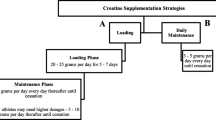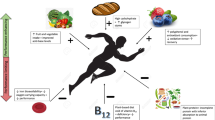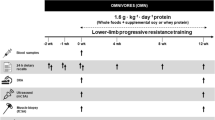Abstract
Objectives
The synergistic effect of resistance exercise and protein ingestion on muscle protein anabolism in young adults has been well described. However, it is unclear if this relationship is maintained in older adults who are at greater risk of sarcopenic muscle loss. To this end, we sought to determine if the synergistic response to a bout of resistance exercise and a protein-rich lean beef meal was altered by age.
Setting
The University of Texas Medical Branch, Clinical Research Center, Galveston, Texas.
Participants
Healthy young (n=7, 29±3 y) and older (n=7, 67±2 y) adults.
Design
Mixed muscle fractional synthesis rate (FSR) was calculated during a 3 h post-absorptive/rest period and again during a 5 h period following ingestion of a protein-rich meal (340 g lean beef) and bout of resistance exercise (6 sets of 8 repetitions of isotonic knee extension exercise at 80% one repetition maximum).
Measurements
Venous blood samples and vastus lateralis muscle biopsy samples were obtained during a primed (2.0 µmol/kg) constant infusion (0.08 µmol·kg−1min1) of L- [ring-13C6] phenylalanine.
Results
Mixed muscle FSR increased by approximately 108% in both young [pre: 0.073+0.008; post: 0.156±0.021 (SE) %/h, p<0.001] and older adults (pre: 0.075+0.004; post: 0.152+0.017 %/h, p=0.003) following the meal and resistance exercise bout.
Conclusion
Aging does not diminish the increase in muscle protein synthesis following a high-quality protein rich meal and bout of resistance exercise.
Similar content being viewed by others
References
Evans W. Functional and metabolic consequences of sarcopenia. J Nutr 1997;127:998S–1003S.
Taaffe DR. Sarcopenia—exercise as a treatment strategy. Aust Fam Physician 2006;35:130–134.
Biolo G, Maggi SP, Williams BD, Tipton KD, Wolfe RR. Increased rates of muscle protein turnover and amino acid transport after resistance exercise in humans. Am J Physiol 1995;268:E514–520.
Hikida RS, Staron RS, Hagerman FC, et al. Effects of high-intensity resistance training on untrained older men. II. Muscle fiber characteristics and nucleo-cytoplasmic relationships. J Gerontol A Biol Sci Med Sci 2000;55:B347–354.
Kosek DJ, Kim JS, Petrella JK, Cross JM, Bamman MM. Efficacy of 3 days/wk resistance training on myofiber hypertrophy and myogenic mechanisms in young vs. older adults. J Appl Physiol 2006;101:531–544.
Phillips SM, Tipton KD, Aarsland A, Wolf SE, Wolfe RR. Mixed muscle protein synthesis and breakdown after resistance exercise in humans. Am J Physiol 1997;273:E99–107.
Phillips SM, Tipton KD, Ferrando AA, Wolfe RR. Resistance training reduces the acute exercise-induced increase in muscle protein turnover. Am J Physiol 1999;276:E118–124.
Paddon-Jones D, Sheffield-Moore M, Katsanos CS, Zhang XJ, Wolfe RR. Differential stimulation of muscle protein synthesis in elderly humans following isocaloric ingestion of amino acids or whey protein. Exp Gerontol 2006;41:215–219.
Paddon-Jones D, Sheffield-Moore M, Zhang XJ, et al. Amino acid ingestion improves muscle protein synthesis in the young and elderly. Am J Physiol Endocrinol Metab 2004;286:E321–328.
Symons TB, Schutzler SE, Cocke TL, Chinkes DL, Wolfe RR, Paddon-Jones D. Aging does not impair the anabolic response to a protein-rich meal. Am J Clin Nutr 2007:86:451456.
Tang JE, Perco JG, Moore DR, Wilkinson SB, Phillips SM. Resistance training alters the response of fed state mixed muscle protein synthesis in young men. Am J Physiol Regul Integr Comp Physiol 2008;294:R172–178.
Wilkinson SB, Tarnopolsky MA, Macdonald MJ, Macdonald JR, Armstrong D, Phillips SM. Consumption of fluid skim milk promotes greater muscle protein accretion after resistance exercise than does consumption of an isonitrogenous and isoenergetic soy-protein beverage. Am J Clin Nutr 2007;85:1031–1040.
Cuthbertson D, Smith K, Babraj J, et al. Anabolic signaling deficits underlie amino acid resistance of wasting, aging muscle. Faseb J 2005;19:422–424.
Rennie MJ, Bohe J, Wolfe RR. Latency, duration and dose response relationships of amino acid effects on human muscle protein synthesis. J Nutr 2002;132:3225S–3227S.
Phillips SM. Physiologic and molecular bases of muscle hypertrophy and atrophy: impact of resistance exercise on human skeletal muscle (protein and exercise dose effects). Appl Physiol Nutr Metab 2009;34:403–410.
Symons TB, Sheffield-Moore M, Wolfe RR, Paddon-Jones D. A moderate serving of high-quality protein maximally stimulates skeletal muscle protein synthesis in young and elderly subjects. J Am Diet Assoc 2009;109:1582–1586.
Rasmussen BB, Tipton KD, Miller SL, Wolf SE, Wolfe RR. An oral essential amino acid-carbo hydrate supplement enhances muscle protein anabolism after resistance exercise. J Appl Physiol 2000;88:386–392.
Tang JE, Manolakos IT, Kujbida GW, Lysecki PJ, Moore DR, Phillips SM. Minimal whey protein with carbohydrate stimulates muscle protein synthesis following resistance exercise in trained young men. Appl Physiol Nutr Metab 2007;32:1132–1138.
Bergstrom J. Percutaneous needle biopsy of skeletal muscle in physiological and clinical research. Scand J Clin Lab Invest 1975;35:609–616.
Patterson BW, Zhang XJ, Chen Y, Klein S, Wolfe RR. Measurement of very low stable isotope enrichments by gas chromatography/mass spectrometry: application to measurement of muscle protein synthesis. Metabolism 1997;46:943–948.
Wolfe RR, Chinkes DL. Isotope Tracers in Metabolic Research: Principles and Practice of Kinetic Analysis. Second ed Hoboken, New Jersey: John Wiley & Sons, Inc; 2005.
Calder AG, Anderson SE, Grant I, Menurlan MA, Garlick PJ. Tne determination of low d5-phenylalanine enrichment (0.002–0.09 atom percent excess), after conversion to phenylethylamine, in relation to protein turnover studies by gas chromatography/electron ionization mass spectrometry. Rapid Comm Mass Spec 1992;6:421–424.
Elliot TA, Crée MG, Sanford AP, Wolfe RR, Tipton KD. Milk ingestion stimulates net muscle protein synthesis following resistance exercise. Med Sci Sports Exerc 2006;38:667–674.
Tipton KD, Ferrando AA, Phillips SM, Doyle D, Jr., Wolfe RR. Post exercise net protein synthesis in human muscle from orally administered amino acids. Am J Physiol 1999;276:E628–634.
Drummond MJ, Dreyer HC, Pennings B, et al. Skeletal muscle protein anabolic response to resistance exercise and essential amino acids is delayed with aging. J Appl Physiol 2008;104:1452–1461.
Fujita S, Dreyer HC, Drummond MJ, Glynn EL, Volpi E, Rasmussen BB. Essential amino acid and carbohydrate ingestion before resistance exercise does not enhance postexercise muscle protein synthesis. J Appl Physiol 2009;106:1730–1739.
Tipton KD, Rasmussen BB, Miller SL, et al. Timing of amino acid-carbohydrate ingestion alters anabolic response of muscle to resistance exercise. Am J Physiol Endocrinol Metab 2001;281:E197–206.
Dreyer HC, Drummond MJ, Pennings B, et al. Leucine-enriched essential amino acid and carbohydrate ingestion following resistance exercise enhances mTOR signaling and protein synthesis in human muscle. Am J Physiol Endocrinol Metab 2008;294:E392–400.
Dreyer HC, Fujita S, Cadenas JG, Chinkes DL, Volpi E, Rasmussen BB. Resistance exercise increases AMPK activity and reduces 4E-BP1 phosphorylation and protein synthesis in human skeletal muscle. J Physiol 2006;576:613–624.
Paddon-Jones D, Rasmussen BB. Dietary protein recommendations and the prevention of sarcopenia. Curr Opin Clin Nutr Metab Care 2009;12:86–90.
Campbell WW. Synergistic use of higher-protein diets or nutritional supplements with resistance training to counter sarcopenia. Nutr Rev 2007;65:416–422.
Verdijk LB, Jonkers RA, Gleeson BG, et al. Protein supplementation before and after exercise does not further augment skeletal muscle hypertrophy after resistance training in elderly men. Am J Clin Nutr 2009;89:608–616.
Katsanos CS, Kobayashi H, Sheffield-Moore M, Aarsland A, Wolfe RR. Aging is associated with diminished accretion of muscle proteins after the ingestion of a small bolus of essential amino acids. Am J Clin Nutr 2005;82:1065–1073.
Kumar V, Selby A, Rankin D, et al. Age-related differences in the dose-response relationship of muscle protein synthesis to resistance exercise in young and old men. J Physiol 2009;587:211–217.
Henderson GC, Dhatariya K, Ford GC, et al. Higher muscle protein synthesis in women than men across the lifespan, and failure of androgen administration to amend age-related decrements. FASEB J 2009;23:631–641.
Author information
Authors and Affiliations
Corresponding author
Rights and permissions
About this article
Cite this article
Symonsi, T.B., Sheffield-Moore, M., Mamerow, M.M. et al. The anabolic response to resistance exercise and a protein-rich meal is not diminished by age. J Nutr Health Aging 15, 376–381 (2011). https://doi.org/10.1007/s12603-010-0319-z
Received:
Accepted:
Published:
Issue Date:
DOI: https://doi.org/10.1007/s12603-010-0319-z




